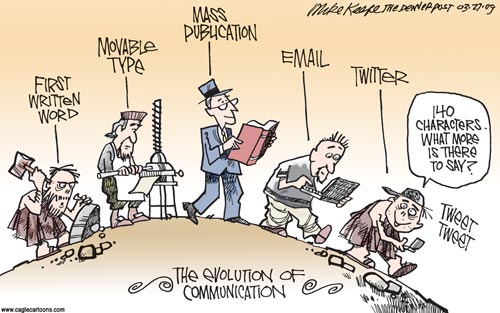Ever since the dawn of time man-kind has sought out ways to improve their lives. Throughout the ages; we, as a society, have evolved and so too has the technology we use. This is no coincidence; the evolution of society has a lot to do with the technology around us and the evolution of this is due to the demands that we, as a society, have placed on technology.
"This 'telephone' has too many shortcomings to be seriously considered as a means of communication. The device is inherently of no value to us." -- Western Union internal memo, 1876
The way we communicate has evolved so radically that, for this generation, it’s hard to imagine a time when there were no phones, computers or internet! The telephone; invented by Alexander Graham Bell, came as a direct result of his attempts to improve the telegraph [1], which is a prime example of technology evolving due to the demands of society. The telephone then improved the way we communicated by allowing us to have long distance conversations with others and allowed us to stay socially connected. Before that it was mainly Morse code, face-to-face or postal exchanges.
Almost 100 years after the invention of the telephone the idea of the internet was starting to take shape. The Internet evolved from ARPANET (Advanced Research Projects Agency Network), an effort supported by the United States Department of Defence. The developers of ARPANET wanted to make communication between separate computer systems at various universities and research laboratories more convenient [2]. Soon after the ARPANET went "live" many more universities joined to share their research with each other and they were soon followed by numerous labs, companies and other educational institutes. The main idea was to connect people and share knowledge. Due to societies demands on this new technology it started to grow to suit our needs. When it was first launched it was used by engineers who were highly trained. Then computers became user friendly and affordable for the general public.
There is no reason anyone would want a computer in their home.- Ken Olson, president, chairman and founder of DEC
Slowly but surely everyone was being exposed to computers and slowly but surely they became an important part of our lives. Then we started to connect to each other via the internet. Suddenly it wasn't just engineers or trained personnel using the internet but the average Joe Bloggs was now "online". Companies started to sell their goods online, information was more accessible and we as a society were evolving just like we had with the telephone and the internet started to evolve with us.
As well as computers and the internet evolving with our society so too did the telephone. It became mobile and wireless. First-generation analog cellular phones appeared in the early '80s as expensive relief for those awaiting the convienance of wireless telephoney[3]. This is was due to the demands we had placed upon the telephone. It was no longer convenient for us to be sitting around waiting by the phone, we needed the phone to be with us at all times. The second generation cellular systems appeared a decade later. They dealt successfully with the shortfalls of the analog system: the lack of security and privacy, limited network feature and high costs[3]. Ten years later third generation initiatives emerged that were designed to enhance the air interface do that mobile services could bring new services to subscribers rather than merely keeping up with the wireline offerings[3]. Now that we are in the third generation of mobile telephoney it is possible for us to make and receive calls, send and receive messages, take photos and videos, connect to the internet and send and receive emails where ever we go and this is all done completely wirelessly. Now our mobile phones have merged with mp3 players and allow for mp3 playback and recording. But with all good things there comes a price. Having a mobile phone makes you permanently contactable [4]. You can't avoid calls, as missed calls are recorded on your phone and you’re constantly reminded of it. Our privacy has been reduced ever so slightly, but this is a small price to pay or portability and convenience.
The internet, and social media on it, merely allows us to extend the range of our conversations. Instead of chatting over the garden fence we are chatting across oceans; instead of meeting in pubs and bars we gather in virtual spaces.[5]
-Colin Walker (Are We Just Jumpig On the Social Media Bandwagon)
Now our society has evolved with technology to a point where it has become almost impossible to live without it. Most technology offers us a service which makes our lives a bit easier, and a big part of our lives is communication. Websites like Facebook and Twitter are revolutionizing how we are communicating and socializing. William Reader, a professor of psychology believes it is too early to answer if these social networks are good or bad for society[6]. Some opponents of Facebook believe these online communities will lead to a society where we no longer have face to face communication [6]. According to their website, Facebook has over 500million active users, the average user has 130 friends and users spend over 700 billion minutes per month on Facebook [7]. Is this the next step in the evolution of society?
References
[1]http://inventors.about.com/od/bstartinventors/a/telephone.htm
[2]http://www.boutell.com/newfaq/history/inventednetwhy.html
[3]http://hosting.udlap.mx/profesores/luisg.guerrero/Cursos/IE464/MaterialdeApoyoIE464/MobilePhoneMeetsInternetIEEESpectrumAugust1999.pdf
[4]http://www.itu.int/telecom-wt99/press_service/information_for_the_press/press_kit/backgrounders/backgrounders/social_impact_mobile.html
[5]http://shegeeks.net/are-we-just-jumping-on-the-social-media-bandwagon
[6]http://www.suite101.com/content/facebook-society-a178406
[7] http://www.facebook.com/press/info.php?statistics

No comments:
Post a Comment